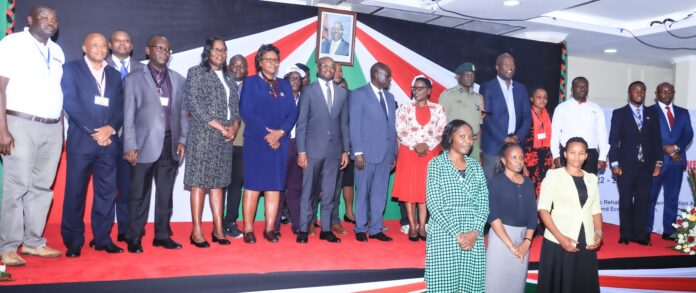By Lillian Museka
Nairobi, Kenya:In the heart of the vibrant Nairobi city, the renowned Kenya International Convention Centre (KICC) served as the venue for an enlightening event – the launch of Correctional Service Week 2023, themed “Promoting Holistic Rehabilitation and Reintegration for Sustainability and Economic Growth.”
The correctional facility, once emblematic of isolation, has undergone a transformation into a symbol of hope and rehabilitation. As the clock struck, the atmosphere brimmed with anticipation, and the event commenced with a solemn ceremony. A procession from Magereza House to KICC set the tone, followed by a documentary highlighting the vital role of correctional services in the criminal justice system.
Deputy President Rigathi Gachagua officially inaugurated the event, emphasizing the necessity to enhance mechanisms within the judiciary. Gachagua emphasized the importance of diverting petty offenders towards non-custodial sentences, involving community work, to alleviate the strain on already overcrowded prisons.
“Our resources are already overstretched and crowding the current prisons with petty offenders makes it more challenging. There is need to encourage non-custodial sentences with petty offenders serving community work,” he said
The Deputy President also noted that with the current increase in youthful population that make up 75% of the total population, there is a need to encourage innovative ideas that allow them to venture into entrepreneurship rather than waiting for formal employment. He added that many youths get frustrated when they don’t secure employment hence leading to them getting into criminal activities, leading to their arrests and incarceration
 He however added that prisons should not be made to look like punishment areas but corrective services which should not be used to condemn anyone but make them better people. He urged prison officers to mentor the inmates and help them in their transformation adding that there is need to relook into the issue of obtaining a certificate of good conduct which has been a big challenge for ex-inmates.
He however added that prisons should not be made to look like punishment areas but corrective services which should not be used to condemn anyone but make them better people. He urged prison officers to mentor the inmates and help them in their transformation adding that there is need to relook into the issue of obtaining a certificate of good conduct which has been a big challenge for ex-inmates.
“We are not just celebrating an institution; we are celebrating lives transformed, second chances granted, and a commitment to creating a society where every individual has the opportunity for redemption and there is a need for us to relook into the issue of certificates of good conduct,” he added.
The three day’s agenda was diverse, featuring panel discussions, educational programs, and exhibition of products made by inmates which included handmade crafts, artworks, African bags and attires, and a variety of furniture. The message was clear: rehabilitation was not just a concept but a tangible reality within the facility’s walls.
The first panel discussion on Youth Empowerment through skills acquisition for market competitiveness and crime prevention showcased success stories of individuals who had successfully reintegrated into society after serving their sentences. The auditorium resonated with applause as each tale unfolded – stories of resilience, determination, and the unwavering human spirit.
Through the discussion moderated by Crime Si Poa Executive Director Mr. Peter Ouko, an organization that is partnering with the correctional department, the returning citizens expressed some of the challenges they are facing in their quest to making their lives better including getting a certificate of good conduct, stigma and lack of capital to start businesses, among others. They were however glad that they gained skills while in the correctional facilities that have since helped them in securing income generating activities.
One of the Panelists, Ciru Waweru, a board member at Kenya Association of Manufacturers called on the need for the correctional department to adapt to the new changing technology in their skills-based training for the inmates to have a competitive edge at the global market.
Ciru noted that the current product designs being produced in the prisons are outdated and may not compete with modern products. “We are spending more time teaching the inmates outdated skills that are not competitive with the current technology. When the inmates finish their sentence, it becomes impossible for manufacturers to give them jobs as their skills do not meet global standards, she said, adding that there is need to establish innovation centers at the prison training facilities that will allow collaborative efforts from stakeholders in helping inmates update their skills
Day two saw a panel discussion on harnessing digital technology for effective access to justice and rehabilitation of offenders, with panelists calling for the need to introduce digital technology among inmates to enable them secure opportunities in the changing world once they have served their sentence.
Strengthening partnerships and collaborations in corrections management for effective community safety was a panel discussion undertaken on the final day. The session was moderated by Principal secretary, state department for correctional services, Ms. Salome Muhia-Beacco who called on partners and stakeholders to commit in supporting the transformational course of inmates and their rehabilitation.
In her concluding remarks, Salome said that the department would create a database of all partners and their skills so that they can enhance the collaborative efforts to strengthen the inmate’s skills that are competitive that will increase their employability chances
The pinnacle of the Correctional Service Week was a gala dinner graced by the Chief of Staff and Head of Public Service, Mr. Felix Koskei, to celebrate outstanding services in the department.














